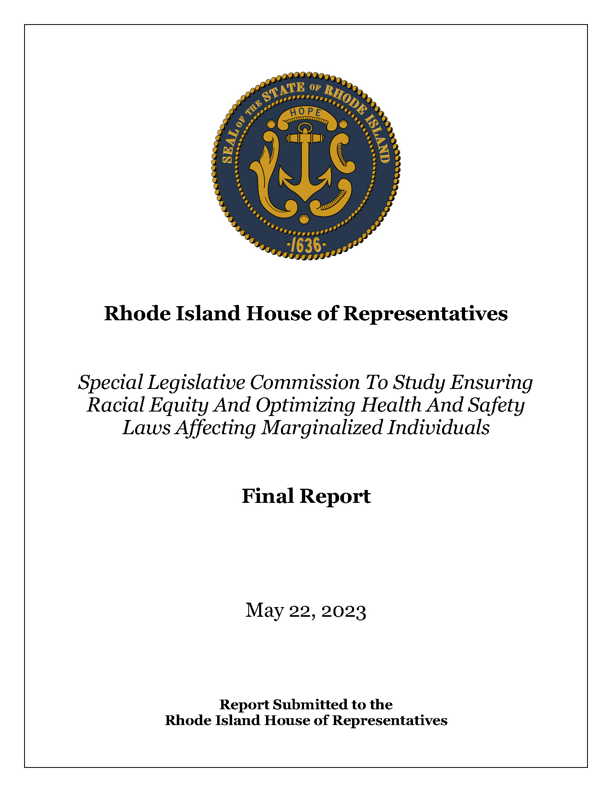September 15, 2023
The Rhode Island special legislative commission to study ensuring racial equity and optimizing health and safety laws affecting marginalized individuals has released a report documenting its findings and recommendations. The commission’s key findings recognize human trafficking as distinct and different from consensual adult sex work and that between 1980 and 2009, when indoor prostitution was legal in Rhode Island, there was a significant decline in sexually transmitted diseases and sexual assaults. When prostitution was again criminalized in 2009, the decline ended.
The commission recommends critical reforms to Rhode Island’s sex work-related laws, including decriminalization. Its final report states that “[the legislature should] consider a Rhode Island law to restore the pre-2009 landscape, such that private, consensual sexual activity remains out of the reach of criminal laws.” The report also recommends a number of incremental legislative measures that Decriminalize Sex Work (DSW) champions around the country, including a law that would provide limited criminal immunity to sex workers and survivors of trafficking who are victims of or witnesses to a crime and the repeal of RI’s “loitering for the purposes of prostitution” law. The report also recommends passage of a bill that would establish a “patient bill of rights.” As sex workers often face stigma and discrimination while seeking health care, this protection is critical in ensuring health and safety. The bill which provided that “a patient shall not be denied appropriate care on the basis of age, sex, gender identity, sexual orientation, race, color, marital status, familial status, disability, religion, national origin, source of income, source of payment, or profession” became law in RI shortly before the release of the report.
The study commission was formed following the unanimous passage of House Resolution 5250, which proposed a special legislative commission to study ensuring racial equity and optimizing health and safety laws affecting marginalized individuals. The bill, as passed, delineated who should sit on the commission, which includes 13 members, including individuals with lived experience. Other members of the commission include two legislators, a member of COYOTE RI, a representative from Amnesty International, two representatives of organizations serving populations disproportionately impacted by the criminalization of commercial sex, the director of the Department of Health, an attorney from the Rhode Island Public Defender’s Office, the Rhode Island attorney general, or designee, a representative from the Brown University Center for the Study of Slavery and Justice, and the president of the Rhode Island Police Chiefs Association, or their designee.
The study commission met eight times starting fall of 2021 with experts from both within the commission and outside of it testifying at each meeting. In her capacity as legal director at DSW and with over 20 years of experience representing and advocating for the legal rights of consensual adult sex workers and survivors of human trafficking, Melissa Sontag Broudo testified in April 2022 about the devastating consequences of the conflation of consensual adult sex work and human trafficking. She helped to draft the legislation proposing the study commission as she believes that public policy should be informed by research and evidence. In April 2023, Broudo and Henri Bynx, DSW’s community engagement consultant, testified together, providing recommendations to the commission. Bynx has testified on the impacts of criminalization on their life as a consensual adult sex worker. A leading advocate for sex worker rights, Bynx spoke powerfully about the critical need for decriminalization — the vital step that would allow individuals marginalized by criminalization to live with less fear and more dignity. In June 2022, Bynx provided testimony on the intersection of sex work and LGBTQIA+ rights.
DSW advocates for the creation of study commissions focused on evaluating prostitution laws, addressing trafficking concerns, and identifying better ways to create support systems for both sex workers and trafficked people.
Read our fact sheet on study commissions to review existing laws and address trafficking and exploitation.
In August 2023, Oregon Governor Tina Kotek vetoed two bills that would establish similar study commissions in Oregon. Read more here: With 2 quiet vetoes, Gov. Tina Kotek pushed back on drive to decriminalize sex work in Oregon
DSW Newsletter #49
RI Legislative Study Commission Releases Report Recommending Reforms to Prostitution Laws

The European Court of Human Rights Agrees To Hear Case Brought by Sex Workers

Tell The New York Times: Sex Work Is Work

DSW and Allies Educate NY Legislators on the Critical Need for Immunity Laws

